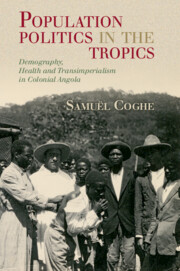Book contents
- Population Politics in the Tropics
- Global Health Histories
- Population Politics in the Tropics
- Copyright page
- Dedication
- Contents
- Maps
- Figures
- Tables
- Acknowledgements
- Note on the Spelling of Proper Names
- Introduction
- 1 Sleeping Sickness, Depopulation Anxieties and the Emergence of Population Politics
- 2 Tropical Medicine and Sleeping Sickness Control Before 1918
- 3 Introducing Social Medicine: Inter-Imperial Learning and the Assistência Médica aos Indígenas in the Interwar Period
- 4 Re-assessing Population Decline: Medical Demography and the Tensions of Statistical Knowledge
- 5 Saving the Children: Infant Mortality and the Politics of Motherhood
- 6 The Problem of Migration: Depopulation Anxieties, Border Politics and the Tensions of Empire
- Conclusion
- Epilogue: Demography and Population Politics, 1945–75
- Bibliography
- Index
4 - Re-assessing Population Decline: Medical Demography and the Tensions of Statistical Knowledge
Published online by Cambridge University Press: 20 January 2022
- Population Politics in the Tropics
- Global Health Histories
- Population Politics in the Tropics
- Copyright page
- Dedication
- Contents
- Maps
- Figures
- Tables
- Acknowledgements
- Note on the Spelling of Proper Names
- Introduction
- 1 Sleeping Sickness, Depopulation Anxieties and the Emergence of Population Politics
- 2 Tropical Medicine and Sleeping Sickness Control Before 1918
- 3 Introducing Social Medicine: Inter-Imperial Learning and the Assistência Médica aos Indígenas in the Interwar Period
- 4 Re-assessing Population Decline: Medical Demography and the Tensions of Statistical Knowledge
- 5 Saving the Children: Infant Mortality and the Politics of Motherhood
- 6 The Problem of Migration: Depopulation Anxieties, Border Politics and the Tensions of Empire
- Conclusion
- Epilogue: Demography and Population Politics, 1945–75
- Bibliography
- Index
Summary
The establishment of the AMI services in 1926 not only changed colonial health paradigms in Angola: it also had a considerable impact on colonial knowledge and debates about the demography of Angola’s ‘native’ population. Driven by persistent fears of depopulation and profound dissatisfaction with existing demographic data, medical doctors used the new AMI framework to probe novel methods of data gathering and analysis. This chapter illuminates the emergence, development and consequences of this ‘medical demography’, as I term the demographic endeavours of colonial doctors. It analyses how, during the interwar years, colonial practices of hygiene and demography became closely intertwined; how medical demography generated new insights into Angola’s population dynamics; and how it played an important role in ongoing debates about the presumed decrease of the colony’s ‘native’ population as well as the ‘racial’ specificities of African population trends.
- Type
- Chapter
- Information
- Population Politics in the TropicsDemography, Health and Transimperialism in Colonial Angola, pp. 146 - 177Publisher: Cambridge University PressPrint publication year: 2022

